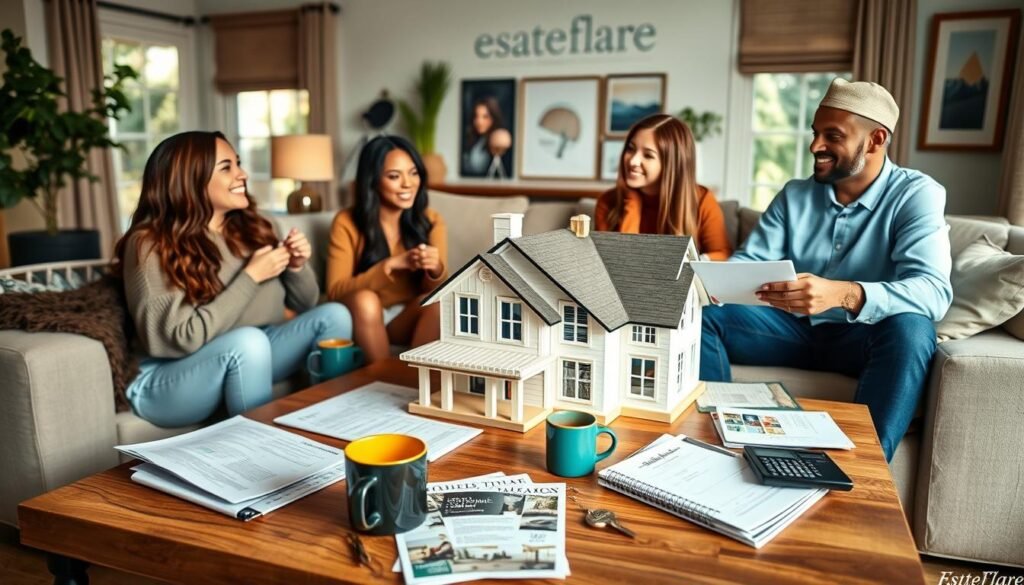In the United States, 93% of first-time home buyers use mortgages. This shows how crucial it is to know about real estate financing. First-time buyer tips will guide you through home loans, credit scores, and down payments, helping you turn your dream of owning a home into reality.
This guide will cover the key steps and strategies for getting the best financing. We’ll talk about improving your credit score and making smart decisions. Whether you’re thinking about buying your first home or are ready to do it, this article will help you. It will give you the knowledge and tools you need to succeed in the real estate market.
Key Takeaways
- Understand the home buying process and prepare for your first purchase
- Establish a realistic budget and learn how to improve your credit score
- Explore various mortgage options and down payment assistance programs
- Discover effective strategies for navigating the housing market and negotiating the best deal
- Develop a comprehensive plan for budgeting and maintaining homeownership
Understanding the Home Buying Process
The home buying process can seem complex and scary, especially for first-timers. But, with the right prep and advice, you can make smart choices and own your dream home. We’ll cover the key steps to preparing for your first home purchase and navigating the mortgage maze.
Preparing for Your First Home Purchase
Before starting your home buying journey, it’s key to check your finances and goals. Look at your credit score, save for a down payment, and learn about mortgage options. These steps will help you make a smart and informed home purchase.
Navigating the Mortgage Maze
The mortgage world can be overwhelming. It involves understanding loan types, paperwork, and approval. We’ll give you the tools and knowledge to navigate the mortgage maze and find the best financing for you.
“Buying a home is a big financial decision. By preparing and understanding the process, you can have a successful and rewarding home buying experience.”
Establishing a Realistic Budget
As first-time homebuyers, creating a realistic budget is crucial. It aligns with your long-term financial goals. You need to assess your current finances, understand homeownership costs, and set a monthly budget. This ensures you can afford your mortgage and other monthly expenses.
Let’s look at what affects your budget for homeownership:
- Mortgage payments: Your monthly mortgage payment includes principal, interest, and taxes and insurance. It’s a big part of your budget.
- Homeowner’s insurance: You’ll need to budget for homeowner’s insurance to protect your home.
- Property taxes: Local property taxes can increase your monthly expenses. Research the tax rates in your area.
- Utilities: Remember to include costs for electricity, gas, water, and internet. These can add up quickly.
- Maintenance and repairs: Owning a home means you’ll need to budget for maintenance, repairs, and possible renovations.
By considering these factors and making a detailed budget, you can manage your monthly expenses. This makes your homeownership journey financially responsible and enjoyable.
| Expense | Estimated Monthly Cost |
|---|---|
| Mortgage Payment | $1,500 |
| Homeowner’s Insurance | $100 |
| Property Taxes | $300 |
| Utilities (Electric, Gas, Water, Internet) | $250 |
| Maintenance and Repairs | $200 |
| Total Monthly Expenses | $2,350 |
Creating a realistic budget is key to your homeownership journey. By understanding your finances and the costs of owning a home, you can make smart decisions. This ensures a smooth transition into your new home.

“Budgeting is the key to financial freedom and a stress-free homeownership experience.”
Improving Your Credit Score
Your credit score is very important when you’re buying a home. It can help you get a good mortgage or hurt your chances. Knowing how credit scores work and how to fix them can help you get better rates.
Credit Score Essentials
Your credit score shows how good you are with money. It’s based on how you pay bills, how much credit you use, and how long you’ve had credit. A higher score means you can get better loans and lower interest rates.
Strategies for Credit Repair
Want to improve your credit score? Here are some ways to do it:
- Check your credit report for mistakes and fix them.
- Pay down your credit card balances to keep your usage under 30%.
- Make sure to pay bills on time by setting up automatic payments.
- Have different kinds of credit, like cards and loans, to show you can handle different types of debt.
- Don’t apply for too much credit at once to avoid hurting your score.
Using these credit repair strategies can help you improve your credit score. This will make you a stronger candidate for buying a home.
“A good credit score is the key to unlocking the best mortgage rates and terms for your first home purchase.”
Saving for a Down Payment
Saving for a down payment can be tough, especially for first-time buyers. But, with the right strategies and help, you can own a home. We’ll look at ways to save and find resources to help you.
Down Payment Assistance Programs
Getting the down payment can be hard. Luckily, there are down payment assistance programs and first-time buyer grants to help. These offer loans, grants, or forgivable loans to help with your down payment.
Some well-known programs include:
- Federal Housing Administration (FHA) loans, which only require a 3.5% down payment
- U.S. Department of Agriculture (USDA) loans, which may provide 100% financing in eligible rural areas
- State and local down payment assistance programs, which can offer grants or low-interest loans
- Employer-assisted housing programs, which can provide financial support for saving for down payment
Using these programs can make saving for a down payment easier. This makes buying a home more possible for first-time buyers.

To save for a down payment, start early and make a plan. Look for all the help you can get. With hard work and the right advice, you can beat the down payment challenge and own a home.
Exploring Mortgage Options
Understanding mortgages can seem hard, but knowing your options is key for first-time buyers. We’ll cover the main mortgage types, interest rates, and loan programs. This will help you choose wisely, matching your financial needs and goals.
There are several mortgage types like conventional, FHA, VA, and jumbo loans. Each has its own rules, benefits, and downsides. It’s important to think about your finances and what fits best.
Conventional loans are popular for their good interest rates and flexible terms. FHA loans need less down payment and are great for those with little savings. They’re perfect for first-time buyers.
VA loans are special for military and veterans. They don’t need a down payment and no private mortgage insurance is needed. Jumbo loans are for expensive homes, over the limits set by Fannie Mae and Freddie Mac.
Choosing the right mortgage type means researching and comparing loan programs and interest rates. This way, you’ll find the best deal. Knowing your options helps you confidently choose your path to homeownership.
| Mortgage Type | Key Features | Ideal for |
|---|---|---|
| Conventional Loan | – Competitive interest rates – Flexible terms – Typically requires 20% down payment |
Buyers with good credit and stable income |
| FHA Loan | – Lower down payment (as low as 3.5%) – More lenient credit requirements – Insured by the Federal Housing Administration |
First-time buyers and those with limited savings |
| VA Loan | – No down payment required – No private mortgage insurance – Available to active military, veterans, and eligible spouses |
Active military, veterans, and eligible spouses |
| Jumbo Loan | – Designed for high-value properties – Exceeds conforming loan limits – Typically requires a larger down payment |
Buyers purchasing luxury or high-end homes |
Knowing about mortgage types and loan programs helps you navigate the mortgage world. You’ll find the right financing for your unique situation and goals.
First-time Buyer Tips
Entering the real estate market as a first-time buyer is both thrilling and challenging. We’ve gathered practical tips and advice to help you through the home-buying journey.
Home Buying Advice for Beginners
If you’re thinking about owning a home or searching for your dream property, these tips are for you. They offer valuable insights and help you make smart choices:
- Understand the local market: Learn about neighborhoods, home prices, and trends to grasp the current market.
- Prioritize your needs: List what you must have in a home to focus your search and find the perfect fit.
- Get pre-approved for financing: Talk to a lender to get pre-approved for a mortgage. This shows you’re serious and helps you know your budget.
- Attend open houses: Open houses let you see properties and learn from real estate agents.
- Hire a experienced real estate agent: A good agent can guide you and offer valuable advice.
- Negotiate like a pro: Don’t hesitate to negotiate the price and terms to get the best deal.
By following these tips and using the help of real estate experts, you’ll become a confident homeowner.

“Buying your first home is one of the most exciting and rewarding experiences you’ll ever have. With the right preparation and guidance, you can navigate the process with confidence and find the perfect property to call your own.”
Selecting the Right Realtor
Choosing the right real estate agent is crucial for a smooth home buying or selling experience. When picking a realtor, consider several important factors. These include realtor selection criteria and working with a real estate agent.
First, look for an agent with deep local market knowledge and a track record of success. A realtor familiar with your area can offer valuable insights. Check their experience, licensing, and client reviews to gauge their expertise and commitment.
Communication style is also key. A good real estate agent is responsive, clear, and keeps you updated. They should listen to your needs, explain things well, and address your concerns.
| Key Criteria for Selecting a Realtor | Buyer Considerations | Seller Considerations |
|---|---|---|
| Local Market Knowledge | Familiarity with neighborhoods, home values, and market trends | Understanding of pricing strategies and effective marketing tactics |
| Experience and Track Record | Number of successful transactions, client testimonials, and awards | Proven history of selling homes quickly and for the best price |
| Communication and Responsiveness | Promptly returning calls, emails, and text messages | Providing regular updates on showings, offers, and negotiations |
| Alignment with Your Needs | Understanding your budget, preferences, and timeline | Developing an effective marketing strategy to showcase your property |
The ideal realtor will guide you through the home buying or selling process. They should advocate for your interests and make the experience smooth. Take time to interview several agents and choose the one that best fits your needs.
“A good real estate agent can be the difference between a stressful and frustrating home buying or selling experience, and a seamless, successful transaction.”
Negotiating the Best Deal
Buying your first home is both exciting and complex. One key step is negotiating a great deal. Using smart negotiation strategies can help you get a better price and more value for your money. Here are some tips to help you negotiate well.
Closing Costs Breakdown
It’s important to know the closing costs when buying a home. These costs include fees for loan origination, appraisal, title insurance, and more. Reviewing these costs can help you find areas to negotiate or ask the seller to cover some expenses.
To negotiate well, analyze the closing costs carefully. Look for ways to save money. You might ask the seller to pay for certain costs or negotiate a lower price to cover these expenses. This approach can make your home buying experience better and save you money.
| Closing Cost Item | Average Cost |
|---|---|
| Loan Origination Fee | $1,500 – $3,000 |
| Appraisal Fee | $300 – $500 |
| Title Insurance | $1,000 – $2,000 |
| Escrow Fees | $500 – $1,000 |
| Recording Fees | $100 – $300 |
Knowing the closing costs helps you negotiate a better deal. This makes the home buying process smoother.

Property Investment Strategies
As first-time home buyers, it’s key to think about the long-term value of your property. Your main home is important, but looking into investment strategies can bring more benefits. It can help you grow your wealth through real estate.
One good strategy is house-hacking. This means buying a multi-unit property, like a duplex, and living in one unit. You can rent out the others. This way, the rental income can help pay your mortgage and even give you extra money.
- Diversify your portfolio by investing in rental properties
- Leverage the equity in your primary residence to purchase investment properties
- Explore short-term rental opportunities, such as Airbnb, to generate passive income
Another option is house flipping. This involves buying a property, fixing it up, and then selling it for a profit. It needs careful planning and a good understanding of the market. But, if done right, it can be very profitable.
“Real estate investing is not just about the property itself, but the strategies you employ to maximize its potential.”
It’s important to do your homework and get advice from experts, no matter your strategy. By exploring these property investment strategies, first-time buyers can grow their assets. This sets them up for long-term financial success in the real estate investing world.
Navigating the Housing Market
First-time buyers face a complex and changing housing market. Understanding the latest trends helps you make smart choices. You can find a home that fits your budget and needs. Here, we’ll share key insights for navigating the real estate world.
Market Trends and Forecasts
The real estate market changes often. It’s important for first-time buyers to stay updated. Experts say the navigating housing market has seen ups and downs lately.
Housing prices are a big trend. Some places see steady price increases, while others see slower growth or even drops. Knowing these differences helps you pick the best place to buy your first home.
Inventory levels also change. Some areas have fewer homes, making it harder to find one. Others have more homes, giving you more choices. Keeping up with these changes helps in your search and negotiations.
“The key to navigating the housing market as a first-time buyer is to stay informed and adaptable. By closely monitoring the latest trends and forecasts, you can make strategic decisions that align with your financial capabilities and long-term goals.”
With the insights from this section, you’ll be ready to find your perfect home. Remember, the real estate world is always changing. Stay alert and flexible as you start your first home buying journey.

Budgeting for Homeownership
Being a homeowner means more than just paying your mortgage each month. You also need to think about property taxes, insurance, utilities, and maintenance costs. It’s important to make a budget that includes these extra expenses to be ready for homeownership’s financial side.
First, figure out how much you can afford to spend on a home. Look at your income, debts, and other bills to set a monthly budget. Don’t forget to save for unexpected repairs or emergencies, as home upkeep can surprise you.
Having a detailed budget for homeownership helps avoid financial shocks. It lets you manage your monthly expenses well. By planning ahead, you can enjoy homeownership while keeping your finances healthy.
- Determine your maximum affordable monthly payment
- Factor in property taxes, insurance, and utility costs
- Budget for ongoing maintenance and repairs
- Set aside funds for unexpected expenses
- Review and update your budget regularly
| Expense | Estimated Monthly Cost |
|---|---|
| Mortgage Payment | $1,500 |
| Property Taxes | $300 |
| Homeowner’s Insurance | $100 |
| Utilities (Electricity, Gas, Water) | $200 |
| Home Maintenance and Repairs | $150 |
| Total Monthly Expenses | $2,250 |
By budgeting for homeownership and planning for all expenses, you can succeed as a homeowner. Remember, good planning helps keep your mortgage, bills, and unexpected costs in balance.
“Homeownership is a long-term investment, and budgeting is essential to ensure you can comfortably manage the ongoing costs.”
https://estateflare.com/sell-real-estate-without-an-agent/
SELL REAL ESTATE WITHOUT AN AGENT: 7 COMMON MISTAKES TO AVOID
Conclusion
We’ve looked into real estate financing for first-time home buyers. We found many useful tips and strategies to help you own a home. By following the first-time buyer tips in this article, you’re ready to face the real estate market.
Improving your credit score, saving for a down payment, and understanding mortgage options are key. This guide gives you the knowledge and tools to make smart choices. With these insights, you’re closer to making your homeownership dream come true.
Starting this journey requires preparation, research, and making informed decisions. With the right approach and the advice from this article, you can find the perfect home. It will meet your needs and preferences.



